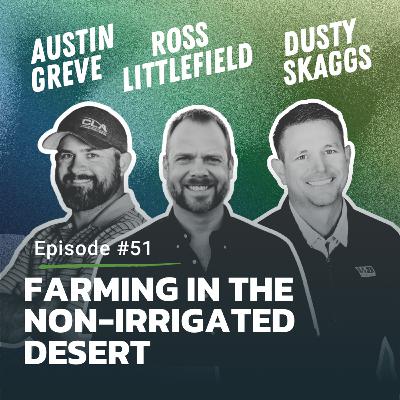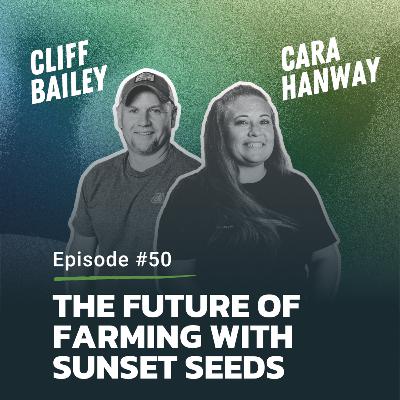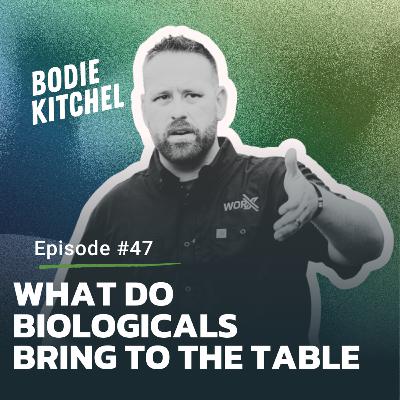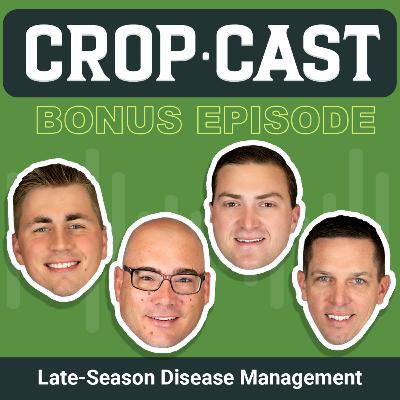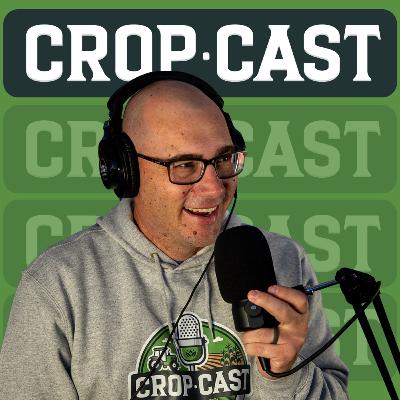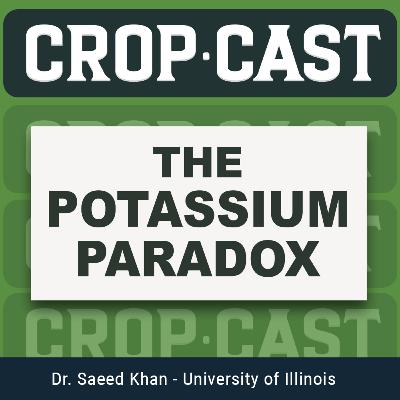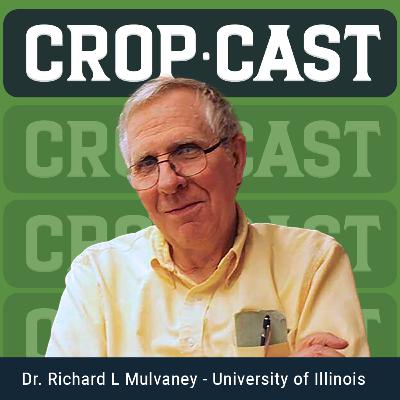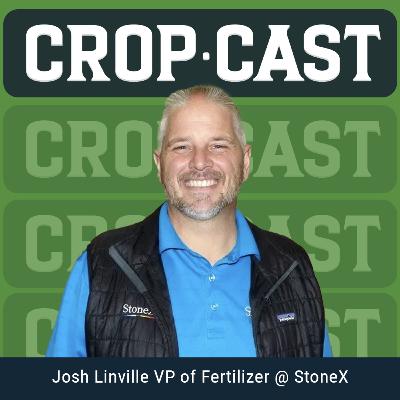Discover Crop Cast by BW Fusion
Crop Cast by BW Fusion

Crop Cast by BW Fusion
Author: BW-Fusion
Subscribed: 19Played: 584Subscribe
Share
© BW-Fusion
Description
Welcome to the "Crop Cast," the premier agronomy podcast by BW Fusion, your trusted partner in crop nutrition. Our mission is to put the control back into the grower's hands and empower them with cutting-edge agronomy tactics and expert insights to maximize their Return on Investment (ROI). Join the Agronomy 365 agronomy team led by Jason Schley as we delve into the science of crop nutrition and uncover the best practices that lead to healthier crops, higher yields, and maximum profitability.
63 Episodes
Reverse
In this episode, Sean Nettleton is joined by Josh Messer to break down canola as an emerging and profitable alternative crop for growers outside its traditional regions. They dive into what makes canola unique agronomically—especially its non-mycorrhizal nature, early phosphorus demand, and heavy sulfur and potassium needs—and how those traits change fertility, rotation, and management decisions. The conversation blends practical field experience with deeper nutrient-cycling insights to help growers decide if canola fits their operation. Listen now.
In this second part of the WEOX series, the BW Fusion agronomy team dives deeper into water-extractable organic carbon (WEOC)—framed as the “currency of the soil”—and why it may be one of the most important soil metrics growers aren’t paying enough attention to. The conversation explores how management decisions, such as excess nitrogen, crop rotation (especially soybeans), tillage intensity, and soil structure, directly build or destroy available carbon in the soil. The hosts explain why nothing in biology works for free, how plants “spend” sugar just like money, and why balanced plants with efficient photosynthesis are the foundation of resilient soils, nutrient efficiency, and long-term profitability. Ultimately, the episode challenges growers to move beyond absolutes and rethink fertility, tillage, and rotation decisions through the lens of carbon efficiency rather than inputs alone.
In this episode of The Crop Cast, Sean sits down in person with Jason, Brandon and John from AgriVision Solutions in northwest Missouri for a wide-ranging, candid conversation about the evolution—and current challenges—of precision agronomy. The discussion traces the journey from early GPS yield monitors and grid sampling to today’s cloud-based data systems, highlighting a critical truth: collecting data is easier than ever, but turning it into accurate, actionable decisions is harder than ever. The group digs into why soil test “build and maintain” philosophies often fail to explain yield variability, how carbon and biology are the missing drivers behind nutrient availability, and why ROI, not just yield, must become the primary metric for modern farming. This episode is a thoughtful, experience-driven look at questioning assumptions, embracing better diagnostics, and learning how to grow more efficiently by understanding the why behind the dataBioBoost by BW Fusion: bwfusion.com/trustthedust AgriVision Solutions Facebook: https://www.facebook.com/agrivisionsolutions AgriVision Solutions Website: https://agrivisionsolutions.com/agronomy/#
In this episode of The Crop Cast, Sean Nettleton sits down with Jason Schley and Bodie Kitchel to unpack one of the most misunderstood but important concepts in modern agronomy: WEOC (Water-Extractable Organic Carbon) — the true “currency” that fuels soil health, nutrient release, and long-term productivity. The conversation dives into why WEOC isn’t a buzzword or sales term, but a metric that underpins every biological and chemical reaction in the soil. Through stories from the field, years of data, and clear analogies, the team explains how carbon saturation, nitrogen management, population stress, mineralization, and plant health all stack together into a systems approach. They challenge outdated agronomic assumptions, highlight the economic cost of mismanagement, and show farmers how building carbon, not just applying fertilizer, is the path to healthier soils, healthier plants, and more profitable acres.
This episode of Crop Cast is a high-energy roundtable with the BW Fusion agronomy team focused on what farmers really need moving into the 2026 crop year. The conversation centers on BW Fusion’s upcoming Agronomy Road Shows (details below) and, more importantly, the philosophy behind them: moving beyond product pitches and outdated fertility dogma toward efficiency collaboration, and stress management. The team explains how soil and tissue data, farm-specific diagnostics, and grower-to-grower learning help identify true limiting factors—rather than chasing generic benchmarks or “magic numbers.” Listeners hear why success looks different for every farm, why not every acre needs every product, and why the future of agronomy is about tools, systems, and nuance, not silver bullets. The episode is equal parts invitation, philosophy, and challenge to rethink traditional agronomy through a lens of ROI, adaptability, and community. 2026 Agronomy Roadshow Registration: https://bwfusion.com/roadshow2026 Dates and locations: January 26th: Noblesville, IN Embassy Suites 13700 Conference Ctr Dr S, Noblesville, IN 46060February 3rd: Sioux Falls, SD Canopy Sioux Falls 120 E. 4th Place, Sioux Falls, South Dakota, 57104, USAFebruary 5th: Manhattan, KS K-State Alumni Center 1720 Anderson Ave, Manhattan, KS 66502
In this episode, Sean Nettleton sits down with Jeff Miller of Forefront Agronomy in Plainview, Texas, for a deep dive into the realities of farming in the High Plains. Jeff shares what it takes to grow crops in a drought-prone, low-humidity, highly variable environment where irrigation capacity is shrinking and full crop failures are a real possibility. The conversation spans irrigation management, canopy-temperature technology, water-quality challenges, structured-water treatments, soil constraints, drip-irrigation strategy, and how stress mitigation ties all agronomy decisions together. Jeff also walks through real on-farm results using BioBoost, Relax, Amino, and Full Sun—discussing stand improvement, root development, yield gains, and stress resilience across cotton, corn, and sorghum. It’s a practical, technical, and highly relatable look at what it means to manage crops where every inch of water counts.
In this episode of The Crop Cast, host Sean Nettleton sits down with Nebraska farmer Randy Uhrmacher for a conversation that starts in the field and ends with personal reflection. From strip-till vs. no-till debates to the challenges of irrigating soybeans, Randy shares what’s working—and what isn’t—on his operation.But this isn’t just about crops. Randy opens up about his health journey, how experimenting with diet and blood-sugar tracking reshaped the way he thinks about balance, stress, and even soil management. Together, they explore how the same principles that build strong plants can build stronger people—and why farmers should have a bigger voice in defining what “real food” means. Topics include:• Irrigation and soybean management in Nebraska• Palmer amaranth, waterhemp, and weed-control evolution• Health, diet, and continuous glucose monitoring• The link between soil health, livestock nutrition, and human wellness• Navigating social media and staying positive in agricultureWhether you’re a grower, agronomist, or just someone rethinking health from the ground up, this is an episode that connects agronomy to everyday life.
In this deep-dive episode of the Crop Cast, Sean Nettleton and agronomist Blake Hadley unpack the complex world of phosphorus in soil systems, exploring its chemical, biological, and physical dynamics. Blake discusses how his self-taught, data-driven approach led him to simplify soil science through visual frameworks that connect redox potential (Eh), pH, and biological activity. Together they challenge traditional thinking—like the fixation on the “perfect” soil pH or the outdated simplicity of Liebig’s Law of the Minimum—and instead advocate for a holistic, living-soil perspective.Listeners learn how microbial processes, residue breakdown, and carbon-phosphorus ratios influence availability, why biological activity (and even rain) drives phosphorus mineralization, and how stratification, soil tests, and new extraction methods like Haney’s H3A are shifting how agronomists think about fertility. The episode blends soil science with philosophy—urging growers to measure, question, and evolve their management instead of relying on outdated models.
In this Crop Cast episode, host Sean Nettleton leads a dynamic roundtable with Faith Pierson (Infinity Ag Solutions, Host of Farming with More than Faith), Kyle Olson (Creekside Agronomy, Co-host Dirt 2 Dollars), and Chase Perry (CMP Enterprises, Co-host Dirt 2 Dollars) to unpack how farmers are rethinking fertility, nitrogen management, and long-term soil health through BaselineRx. The group shares real-world examples showing how conventional high-nitrogen programs often create imbalance, weaken plant health, and drive disease pressure — while more measured, biologically-aware programs build stronger soils and more profitable yields. They discuss the philosophy that you can’t manage what you don’t measure, emphasizing continuous soil testing, real-time fertility adjustments, and the integration of tools like FertiCast™ to precisely time inputs. The conversation evolves into how managing carbon-to-nitrogen balance, rather than chasing yield with excess chemistry, is the next frontier for sustainable profitability. Together, they deliver a message of partnership, patience, and progress: fixing the soil fixes the farm — and fertility is the foundation of future success.
In this Crop Cast episode, Mason and the team sit down with Nate Ide of Lester Prairie, Minnesota, to explore how he transformed frustration into innovation through soil biology and data-driven farming. Nate recounts his early struggles trying every product on the market with no success—until he embraced BW Fusion’s biological system and the Agronomy365 framework. His breakthrough came when he realized poor calcium release was limiting yields, prompting his “One Field Challenge,” a practical approach where farmers compare high- and low-yielding zones to identify true biological limitations rather than just nutrient levels. Through perseverance and curiosity, Nate proves that feeding the microbes, not just the soil, can unlock fertility that traditional P&K numbers miss. His story shows how understanding carbon, calcium, and microbial life can transform yield, trust, and the way farmers think about “building” rather than just “growing” crops. It’s a powerful discussion about curiosity, grit, and how agronomy is evolving from chemistry to biology.
In this episode ofCrop Cast, host Sean Nettleton and Mason Claude take a deep dive into one of agriculture’s most persistent challenges: the oversimplification of agronomy. They explore why common “rules” in fertility management, like chasing perfect pH or part-per-million numbers, often lead farmers astray. Mason breaks down why agronomy is less a precise science and more an “art” built from overlapping disciplines — soil physics, chemistry, biology, and meteorology — that must be interpreted with context, not formulas. Together, they bust long-standing myths around lime, soil balancing, and fertilizer response curves, showing how over-liming, ignoring biological activity, or fixating on lab data can actually harm soil function. Instead, they call for a more holistic, data-driven approach that values living soil systems, enzyme activity, and carbon cycling as the foundation for sustainable yield. The episode balances hard agronomic science with honest, farmer-to-farmer perspective, challenging listeners to rethink what “soil health” and “fertility” really mean.
In this episode of Crop Cast host Sean Nettleton is joined in candid conversation with Ross Littlefield and Austin Greve of Correction Line Ag—two-time BW Fusion “Leaders in the Field” award winners—and Dusty Skaggs, BW Fusion Sales Rep for Oklahoma.The discussion centers on the realities of farming in some of the harshest dry land regions of Kansas and Oklahoma, where growers battle limited rainfall, extreme heat, and sandy soils. Despite those conditions, the group emphasizes innovation, adaptive management, and stress mitigation as keys to maintaining profitability and crop health.
Join host Sean Nettleton with Cliff Bailey and Cara Hanway of Sunset Seeds in Northwest Missouri. Cliff and Cara share how their seed dealership grew into a hub for fertility solutions, community support, and agronomic innovation. From redefining roles in their business to embracing cutting-edge tools like Ferticast, the duo highlights the importance of curiosity, customer trust, and a passion for agronomy. They discuss balancing soil health with ROI, the risks and rewards of social media, and how progressive thinking is reshaping the future of farming.
In this episode of Crop Cast, host Sean Nettleton is joined by Mason Claude and Kyle Olson, owner of Creekside Agronomy, to explore how Baseline RX is reshaping fertility management. Kyle shares his journey from using traditional soil tests that fell short to adopting Baseline RX—transforming not only how he advises his customers but also how he manages fertility on his own farm.Together, the group dives into real-world results, from cutting input costs to making more confident and ethical fertility recommendations. Kyle explains why precise soil data isn’t just helpful—it’s essential—and how Baseline RX equips dealers and growers alike to farm smarter, with integrity and efficiency.
Bodie Kitchel knows agriculture—not just from years of supporting growers, but from putting those practices to work on his own farms. Over his career, he’s pushed beyond what’s considered standard, especially when it comes to fertility. His passion for biologics has led him to ask—and answer—the tough questions:What data can growers truly trust?When should intuition take the lead?Why is now the time to be open to biological use on your operation?If you’ve ever wondered how to apply commercial fertilizer more efficiently, this episode is for you. Bodie breaks down how to grow the biology in your soil and rethink the way fertility works on your farm.
Recorded LIVE at the Dealer Meeting 2025, agronomists Jason Schley, Mason Claude, and Josh Messer sit down to tackle one of the hottest topics of the season: the rapid spread of Southern Rust across Midwest farms.This candid conversation dives into the big questions every grower and dealer is asking:How do you build a plan of attack when disease pressure shows up late in the season?When is it still worth the pass—and when is a crop too far gone to save?What strategies actually pay off in protecting yield potential at this stage?With boots-on-the-ground insights and years of agronomy experience, Jason, Mason, and Josh cut through the noise to deliver practical, actionable advice that can make or break a grower’s bottom line.Whether you’re scouting fields, advising growers, or simply wanting to understand the latest agronomic battlefront, this episode is packed with real-world perspective you won’t want to miss.A Day With Agronomy in Wabash, Indiana: Link here: https://bw-fusion.com/a-day-with-agronomy
Host Sean Nettleton brings a quick update on what's coming next for the Crop Cast podcast. Season 2 is launching in early September, and we’re taking a short break to line up a fresh guest list and tackle real, impactful solutions for growers facing a challenging season. Thank you for listening, and stay tuned. There's a lot to look forward to. Find us on social: https://bw-fusion.com/cropcastSubmit a topic or guest request: https://bw-fusion.com/cropcastFind Sean Nettleton on X: https://x.com/sean_nettleton
If you’ve ever questioned whether your K applications are delivering ROI, this episode is a must-listen. Join Sean Nettleton and Dr. S.A. Khan from the University of Illinois to discuss the eye-opening research behind the Potassium Paradox. Dr. Kahn unpacks decades of soil science and long-term field data, challenging the conventional wisdom around potassium (K) fertilization. Dr. Khan explains why most Midwestern soils already contain more than enough potassium to support crop production and why typical soil tests often fail to accurately represent the true soil availability. For full context and to follow Dr. Khan’s slides, we highly recommend watching the episode on our YouTube channel.Topics Covered:The science behind exchangeable vs. non-exchangeable potassiumHow soil moisture and weather cycles impact soil test valuesWhy overapplying K can hurt calcium, magnesium, and even your soil’s structureResults from over 2,000 response trials across North AmericaPractical, cost-saving fertility recommendations Don’t miss this deep dive into one of the most misunderstood nutrients in agronomy.
In this episode, Dr. Mulvaney challenges the common belief that most of a crop’s nitrogen comes from fertilizer. Instead, he explains that the soil itself is the primary source of nitrogen uptake—thanks to the natural process of mineralization, where organic matter breaks down and releases plant-available nitrogen.Key takeaways:Fertilizer isn’t the dominant source of N—soil N plays a much larger role.Soils differ dramatically in their nitrogen-supplying capacity.Yield-based N recommendations ignore this variation, often leading to over-application.Dr. Mulvaney’s research is focused on improving nitrogen efficiency—boosting crop uptake while minimizing environmental harm. He collaborates with industry partners to refine fertilizer practices and promote the use of the Illinois Soil Nitrogen Test (ISNT) for more precise, site-specific N management.If you’re looking to improve yields without wasting nitrogen dollars, this episode offers critical insights that could reshape how you think about nitrogen use.Watch the full length presentation here: https://youtu.be/JoExUqhuJas
In this insightful episode, Sean Nettleton talks with Josh Linville, a widely followed fertilizer market expert, about the complex dynamics of the global fertilizer industry and its impact on U.S. agriculture.Key Topics Covered:Fertilizer Price Volatility: Josh emphasizes that neither he nor local retailers set fertilizer prices—global events and market structures do. Price swings often stem from geopolitical instability, trade restrictions, and global supply chain disruptions.Global Dependence & Supply Challenges: The conversation highlights how North American agriculture remains tightly linked to international fertilizer markets, including inputs from China, Russia, and the Middle East. Disruptions—like conflicts in the Strait of Hormuz or export bans—can quickly affect local supply and pricing.Domestic Production Gaps: Josh discusses the U.S.'s underinvestment in nitrogen production, despite having cheap natural gas and strong environmental standards. He argues for more domestic manufacturing to reduce dependence and exposure to foreign market volatility.Fertilizer Futures & Market Tools: The industry is slowly evolving toward offering farmers better tools, such as micro futures contracts for urea, to hedge fertilizer costs similarly to how they manage grain risk. But adoption remains in early stages.Fertilizer Efficiency & Biologicals: The two also touch on improving nutrient efficiency through soil testing, biologicals, and smart application timing. Josh acknowledges the role of companies like BW Fusion in helping farmers stretch input dollars with more targeted fertility management.The Call for Education: Both Sean and Josh stress the importance of education and proactive planning. With tight margins, farmers must stay engaged year-round, rather than waiting until fall or spring to make buying decisions.













